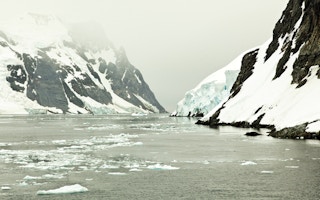The all-too-familiar story of ice loss in the world’s polar regions, repeated over and over by researchers in the last two years, is being told yet again – this time for the benefit of delegates at the UN climate change conference currently being held in Lima, Peru.
A report in Earth’s Future journal by distinguished scientists from an international group called Earth League aims to remind the delegates that time is running out to avert the serious impacts of climate change.
Each summer, most of the surface of Greenland now starts to melt – and to darken, which means it absorbs more light, and becomes increasingly more likely to go on melting.
The same thing is happening in the Arctic Ocean, where open sea is now absorbing radiation that would once have been reflected by sea ice.
Irreversible melting
In West Antarctica, a warming ocean has begun to advance, and the glacial ice to retreat, which means more loss of ice, and more warming, and more retreat. With this retreat comes the first sign of irreversible melting in some parts of the ice sheet.
The snows of the Greenland ice sheet alone hold enough water to raise sea levels by seven metres or more. But the retreat of the ice in the Arctic quite literally opens up new territory for another feedback: as permafrost thaws it will release tens of thousands of years of stored carbon, to stoke up greenhouse gas levels and trigger yet more warming.
There is still a chance that humanity can take steps and limit global average temperature rise to 2°C, but the current rates of greenhouse gas emissions could push temperatures to an average of 4°C or more above the averages at the start of the Industrial Revolution by the end of the century.
“
Considerable risks, with potentially serious impacts, are already expected at 1°C to 2°C warming, which will require large investments in adaptation
“If this occurs,” the Earth League scientists warn, “our climate would be as different from pre-industrial conditions as it was when the Earth began to emerge from the last ice age some 18,000 to 20,000 years ago.”
They add: “Considerable risks, with potentially serious impacts, are already expected at 1°C to 2°C warming, which will require large investments in adaptation.”
If the temperatures rise beyond the 2°C target, societies will experience increasing risks from extreme events, along with other changes that could make several parts of the world “susceptible to extremely high social and economic costs.
This includes risks to global food production, freshwater supply and quality, significant sea level rise, changes in disease patterns and possibly higher risk of pandemics.”
All this, too, has been said before. But the fact that a group of scholars, economists, geographers and meteorologists from distinguished universities, institutes, academies and laboratories in Europe, the US, Mexico, Brazil and India felt the need to say it once more, with feeling, is an indicator of the urgency of the problem.
Greater risk
As things stand, they say, there is a 30 per cent probability that global average temperatures will exceed 2°C by the end of the century. This is a risk “much greater than we normally accept for other potentially dangerous societal risks, such as nuclear power generation, terrorism, and human health epidemics”.
The report’s authors point out that change is possible, and that a global energy revolution has already begun. Energy demand is many developed countries is falling, and renewable energy use increasing.
“The world may be approaching a point,” they say, “where the technological feasibility and economic benefits clearly tip in favour of a large-scale transition to an economy powered by clean and efficient energy.”
However, they warn that these changes can only happen “by prioritising access to cheap modern energy systems and higher mitigation requirements on richer nations who have caused the bulk of CO2 emissions from fossil fuels so far”.










